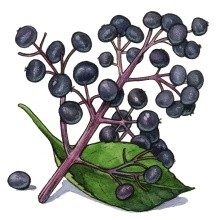Elderberry is the dark purple berry from the European elder tree. The berries are used to make medicine. Do not confuse elderberry with American Elder, Elderflower, or Dwarf Elder. Do not consume wild edibles unless you have clearly identified the species. Recipes for Elderberry jelly and syrup are below.
The elder tree is the gift that keeps on keeping. You might also be familiar with the elderflower (It’s popular in cocktails mixed from the syrup!) The syrup is considered medicinal and according to WebMd it’s used for swollen sinuses (sinusitis), colds, influenza (flu), swine flu, bronchitis, diabetes, and constipation. It is also used to increase urine production (as a diuretic), to increase sweating (as a diaphoretic), and to stop bleeding.
Elderflower is also used as a gargle and mouthwash for coughs, colds, hoarseness (laryngitis), flu, and shortness of breath. It is used on the skin for joint pain (rheumatism), and pain and swelling (inflammation).
But today, we’re here to discuss the elderberry! There are some cool pieces of research that have come out about elderberry and its effect on colds and flu. I’ve included some recipe videos at the end.
Toxicity warning
Although the cooked berries (pulp and skin) of most species of Sambucus are edible, the uncooked berries and other parts of plants from this genus are poisonous. Leaves, twigs, branches, seeds, roots, flowers, and berries of Sambucus plants produce cyanogenic glycosides, which have toxic properties. Ingesting a sufficient quantity of cyanogenic glycosides from berry juice, flower tea, or beverages made from fresh leaves, branches, and fruit has been shown to cause illness, including nausea, vomiting, abdominal cramps, diarrhea, and weakness. In August 1983, a group of 25 people in Monterey County, California became suddenly ill by ingesting elderberry juice pressed from fresh, uncooked Sambucus mexicana berries, leaves, and stems. The density of cyanogenic glycosides is higher in tea made from flowers (or leaves) than it is in berries. The seeds of Sambucus callicarpa are poisonous and may cause vomiting or diarrhea.

STUDY 1: Randomized study of the efficacy and safety of oral elderberry extract in the treatment of influenza A and B virus infections.
Author information Department of Virology, Hebrew University-Hadassah Medical School, Jerusalem, Israel.
Abstract
Elderberry has been used in folk medicine for centuries to treat influenza, colds and sinusitis, and has been reported to have antiviral activity against influenza and herpes simplex. We investigated the efficacy and safety of oral elderberry syrup for treating influenza A and B infections.
Sixty patients (aged 18-54 years) suffering from influenza-like symptoms for 48 h or less were enrolled in this randomized, double-blind, placebo-controlled study during the influenza season of 1999-2000 in Norway.
Patients received 15 ml of elderberry or placebo syrup four times a day for 5 days, and recorded their symptoms using a visual analogue scale.
Symptoms were relieved on average 4 days earlier and use of rescue medication was significantly less in those receiving elderberry extract compared with placebo.
Elderberry extract seems to offer an efficient, safe and cost-effective treatment for influenza. These findings need to be confirmed in a larger study.
Study 2: Elderberry Supplementation Reduces Cold Duration and Symptoms in Air-Travellers: A Randomized, Double-Blind Placebo-Controlled Clinical Trial
Evelin Tiralongo, Shirley S. Wee, and Rodney A. Lea Additional article information
Abstract
Intercontinental air travel can be stressful, especially for respiratory health. Elderberries have been used traditionally, and in some observational and clinical studies, as supportive agents against the common cold and influenza. This randomized, double-blind placebo-controlled clinical trial of 312 economy class passengers travelling from Australia to an overseas destination aimed to investigate if a standardised membrane filtered elderberry (Sambucus nigra L.) extract has beneficial effects on physical, especially respiratory, and mental health.
Cold episodes, cold duration and symptoms were noted in a daily diary and assessed using the Jackson score. Participants also completed three surveys containing questions regarding upper respiratory symptoms and quality of life at baseline, just before travel and at 4 days after travel.
Most cold episodes occurred in the placebo group (17 vs. 12), however the difference was not significant (p = 0.4). Placebo group participants had a significantly longer duration of cold episode days (117 vs. 57, p = 0.02) and the average symptom score over these days was also significantly higher (583 vs. 247, p = 0.05).
These data suggest a significant reduction of cold duration and severity in air travelers. More research is warranted to confirm this effect and to evaluate elderberry’s physical and mental health benefits.
Study 3: Elderberries Block Flu Virus From Attaching To and Entering Human Cells
Scientists have identified a chemical compound in elderberries that immediately immobilizes the flu virus.
The unique phytochemicals found in elderberries block the virus from entering, or even attaching to, our healthy cells, when taken preventatively during flu season.
The extract was also effective at fighting the virus at later stages of infection, by stimulating infected cells to release cytokines – chemical messengers the immune system uses for communication between different cell types to aid in coordinating a more efficient response.
Study 4: Elderberry Cuts Duration of Colds and Flu in Half
Here are two very detailed videos (excellent) that will show you how to prepare nutritious elderberry jelly and syrup.
